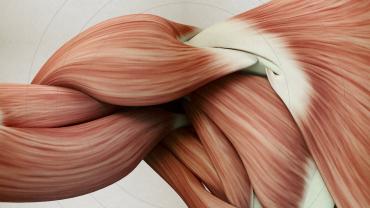
Sarcopenia refers to the progressive age-related loss of skeletal muscle mass and can lead to an increased risk of falls, fractures, and mortality. It can occur as a standalone illness or as a result of other factors, including certain systemic illnesses, particularly those involving inflammatory processes. The loss of skeletal muscle has been associated with certain consequential changes in inflammatory status, antioxidative status, and glucose metabolism. Some recent studies have investigated a potential link between age-related muscle loss and the relative abundance of biota in the gut microbiome.
An animal study reported an increase in endurance capacity, muscle strength, and muscle mass with the administration of Lactobacillus and Bifidobacterium. The study was conducted on aged mice.
Another study investigated the relationship between exercise and the connection between the gut microbiome and its health. Results indicated improvements in muscle function parameters and increases in fecal butyrate levels. Butyrate is a short-chain fatty acid (SCFA) that has been shown to help support inflammatory status, gut function, and many other aspects of human health.
The maintenance of muscle mass has been shown to be related to both the gut microbiome and healthy glucose metabolism. The loss of skeletal muscle has been associated with decreases in the muscular ability to utilize glucose. Evidence suggests there is a bidirectional relationship between the risk of developing sarcopenia and conditions associated with impaired glucose metabolism. While the biochemical mechanisms are not yet fully understood, research indicates that probiotics may help support blood sugar homeostasis and help modulate certain aspects of insulin resistance. Studies suggest that probiotics may help decrease the levels of certain pro-inflammatory cytokines. They may help reduce the abundance of microbiota related to the inflammatory response and insulin resistance.
Probiotics such as Lactobacillus casei have been shown to help influence the function of pancreatic β-cells in individuals with prediabetes and may help modulate the production and activity of certain SCFAs. The administration of certain probiotics was shown in one study to help reduce bacteria associated with insulin resistance. Probiotic intake was also shown to help reduce populations of Firmicutes, which is associated with the inflammatory response and insulin resistance.
Although more research is needed, particularly in the clinical setting, evidence suggests that there may be a connection between healthy muscle integrity and the composition of the gut microbiome. Probiotics may help support a healthy gut microbiome, which may in turn help to promote healthy aging, glucose metabolism, and certain aspects of musculoskeletal health. Probiotics can be found in sauerkraut, kefir, kimchi, grass-fed yogurt, tempeh, and other naturally fermented foods.
By Dr. C Ambrose, ND, MAT